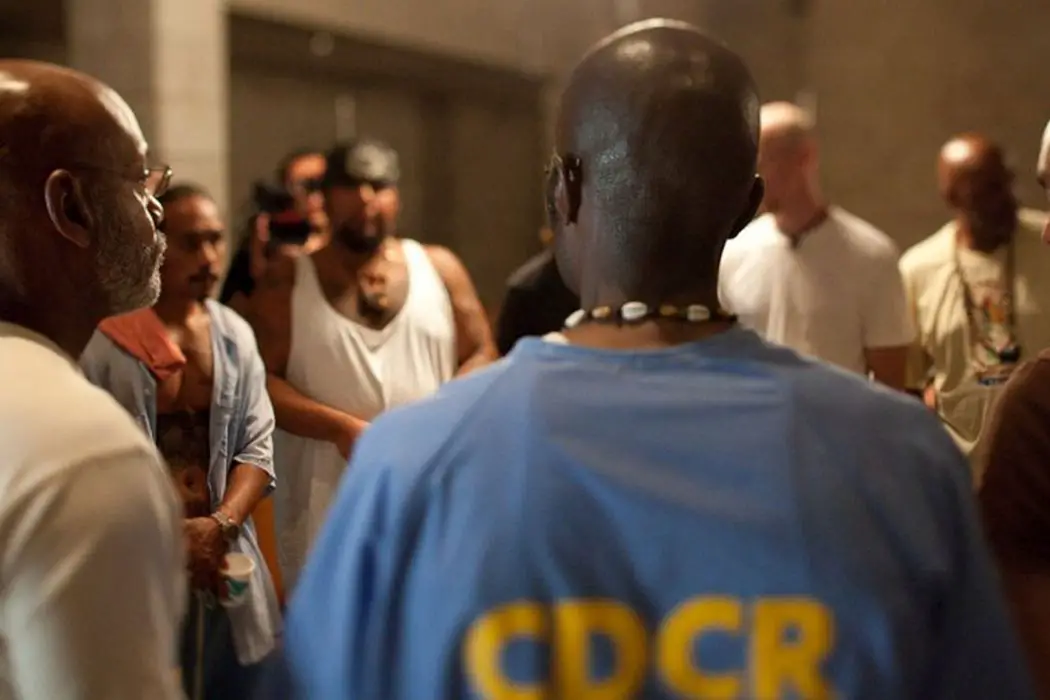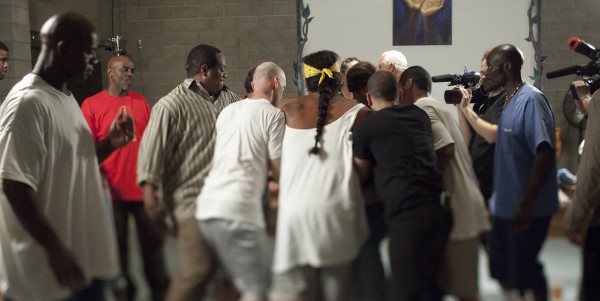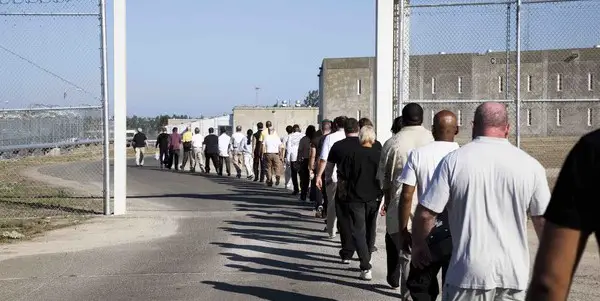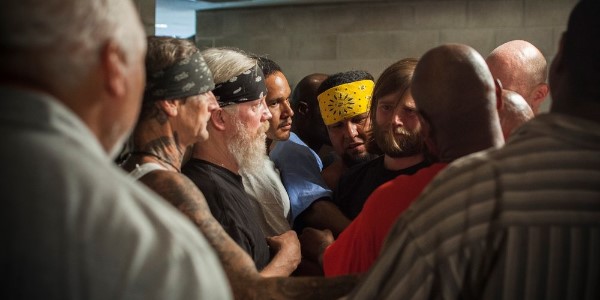THE WORK: The Prison Therapy Experience Is Essential

Musanna Ahmed is a freelance film critic writing for Film…
As a report on Prison Policy Initiative from earlier this year states, the USA currently holds the dubious distinction of having the highest incarceration rate in the world and a report published last year by the United States Sentencing Commission found the recidivism rate to be at almost 50%. There’s no easy answer for the successful rehabilitation of convicts but a group-therapy retreat that takes place in the maximum-security Folsom State Prison may just be it. That program is the subject of the masterful new documentary The Work.
Over the course of four days, a group made up of convicted inmates, facilitators and outsiders gather together inside the prison to open themselves up to each other about their deeply personal problems so they can then help each other to reach within themselves for the purpose of achieving contentment. This is carried out through discussions revolved around the betrayals they’ve faced and letting go of the anger they feel through physical and emotional engagements.
It may sound like a simple exercise but the extent to which these men have suppressed their emotions means it requires a considerable amount of emotional engagement for this treatment to work, or as one of the inmate’s remarks to another after an intense but productive session, “It takes a lot to balls to do what you just did, man.”
Up, Cose and Personal
The sequences of the men sobbing and cleansing themselves of their negative emotions are incredibly intense and startling. Murderers at their most vulnerable. Adult men bawling their eyes out and hugging the other group members, particularly one inmate named Vegas who always steps forward towards his fellow group members, maintaining eye contact just a millimeter away whilst repeatedly ensuring the vulnerable participant that he’s right there for him. We witness these scenes less an arm’s length away as the filmmakers expertly capture the main actuality moments from over the shoulders behind the circle.

Raw Footage
The camerawork isn’t entirely competent though, with a few displays of unsteady hands and some uncertainty on the zoom levels. However, this rawness only further adds to the authenticity because, presupposing legendary filmmaker Alan Parker’s dictum that each frame is a manipulation, the filmmakers make no attempt to affect what we see on-screen. The structure of the story is straightforwardly chronological, the only non-diegetic dialogue plays at the start of the film when the outsiders Brian, Chris and Charles arrive at the prison (we hear their reasons for joining the program via voice-over), the workmanlike editing efficiency cuts down four days to ninety minutes and the score is minimal.
There are two pieces – one is heard in the aforementioned arrival scene immediately after the arrivals are told “Gentlemen, you’re going into a maximum-security prison and you’re being watched right now.” It’s a piece that complements these words in establishing a melancholy atmosphere, and is so effective at doing so because it sets the mood for the entirety of the film. The second piece is heard as we cut to black at the end and likewise evokes a circumstance-appropriate emotion – a much more uplifting one.

This group therapy session is a space where everybody is emotionally available and necessarily so. A title card at the start of the film tells us how the racial segregation of the prison yards is left at the door. This results in a group of men with a diverse mix of races, ages, ideological upbringings and family histories. The variety of these backgrounds unintentionally prevents the possibility of repetitiveness that may have arisen in containing similar stories from similar individuals.
Some of the participants, particularly the outsiders, don’t expect themselves to be so overwhelmed and honest about their true feelings but find themselves surprisingly affected. One of the outsiders, Brian, expresses his skepticism in the first group conversation, which plays out like a normal therapeutic conversation, stating that having such an ordinary therapeutic conversation “doesn’t work, just doesn’t f*cking work.”
Misunderstood Manhood
The surprise of the participants being able to candidly express themselves through both words and tears is accentuated by their subscription to society’s norm regarding men shedding tears. Inmate Kiki, who is the first in the group to share his sentiments, says as he attempts to allow himself to wear his heart on his sleeve that he’s held back by his armor, an armor that prevents him from freely crying, when he just wants to be like other prisoners there who have let go of their baggage.
Chris talks to the other outsiders on the bus home at the end of the first day about how he hasn’t broken down yet (but knows that his assigned group members are trying to help him engineer this) and that we live in a society where male stoicism is standard. It’s not long after when he begins to well up and admits that he had been ‘out’ for the first day but an exercise involving childhood reminiscence causes tears to pour out. “I was such a happy kid”, he says of his emotional state in comparison. As well as seeming like the answer to accomplishing successful convict rehabilitation, the program also has the power to help break down toxic masculinity.

I have now seen The Work twice. The first time I viewed it was at the Sheffield Doc/Fest, the UK’s premier event for documentary films, where it won the Audience Award to the surprise of nobody else who saw it. I was able to speak to co-director Jairus McLeary after the film. It may have been only him and his close associates (including his brothers Eon and Miles McLeary who are credited as producers and camera assistants) who were able to make this film due to their access. Their father is a co-founder of the program and is seen throughout the film including the beginning, when he introduces everyone in the room to the program.
McLeary told me that his whole crew as well as himself had undertook the therapy themselves which helped establish the trust and intimate access they have to their subjects. Without this acquired level of intimacy, the film significantly loses its effect. He also told me that it took nine years to bring the film to the big screen, largely due to funding issues, and since then the program has found its way to other prisons and has had similarly successful results.
The Work: Conclusion
With its harrowing, but simultaneously relieving, sequences of men releasing years of pent-up emotions through abreaction and its graceful handling of major social issues, The Work is an essential piece of filmmaking that’s powerful in its observation and packs a strong emotional punch.
It has taken nine years for this documentary to be brought to the big screen and now that it’s here, The Work is a film that deserves attention at the federal level so the program can be employed throughout all of the country’s prisons, then in institutions beyond prisons, and subsequently across the whole world, for the benefit of everyone.
Do you agree with me that The Work has the ability to bring about social change?
The Work is in UK cinemas now and will have a limited release in the US on the 20th October. For the release dates in other countries see here.
Does content like this matter to you?
Become a Member and support film journalism. Unlock access to all of Film Inquiry`s great articles. Join a community of like-minded readers who are passionate about cinema - get access to our private members Network, give back to independent filmmakers, and more.
Musanna Ahmed is a freelance film critic writing for Film Inquiry, The Movie Waffler and The Upcoming. His taste in film knows no boundaries.













